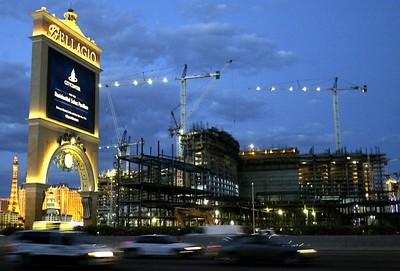Big buzz, surging stock

If part of the goal behind billionaire investor Kirk Kerkorian’s proposal to acquire two of MGM Mirage’s largest pieces was to bring added value to the company, his efforts succeeded Tuesday.
Shares of MGM Mirage continued to skyrocket in value on the New York Stock Exchange, while Wall Street lauded the announcement that the company’s board of directors was considering entering discussions with the 89-year-old Kerkorian — the company’s largest shareholder — about his buying both Bellagio and the under-construction CityCenter.
Shares of MGM Mirage closed Tuesday at $79.98, up $17.03, or 27.05 percent. The price rose as high as $82.25 at one point during the day. More than 19.2 million shares were traded. In one day, MGM Mirage’s market capitalization jumped from just less than $18 billion to $22.7 billion, propelling Kerkorian’s net worth alone up by $2.6 billion.
On Monday, shares in the company jumped almost 16 percent in after-hours trading following Kerkorian’s announcement.
MGM Mirage Chairman Terry Lanni, during Tuesday morning’s previously scheduled annual shareholders’ meeting at the MGM Grand, repeated the company’s statement from Monday; the board would listen to what Kerkorian had to propose. Lanni said he would not take questions on the Kerkorian announcement from shareholders.
Afterward, the company’s board met in a regularly scheduled private meeting but nothing was revealed publicly.
Through Tracinda Corp., Kerkorian’s privately held investment arm, the Los Angeles-based financier said Monday he wanted to pursue strategic alternatives with MGM Mirage with respect to his investment in the company. Kerkorian controls more than 158.8 million shares of MGM Mirage, or 56 percent of the company.
Prudential Equity Group gaming analyst Joel Simkins said the industry, which has seen two of its largest casino operators, Harrah’s Entertainment and Station Casinos, become private equity buyout targets in the past year, will be watching what transpires with MGM Mirage.
Simkins said that if this is a move toward MGM Mirage also going private, some of the company’s 19 casinos could become acquisition candidates.
"We can only guess at what the strategic alternatives and financial restructuring transactions could be, but there are potential ramifications for the rest of the industry," Simkins said in a note to investors. "If successfully executed, we feel this will be a transformational event and value creation opportunity for MGM Mirage."
The structure of any deal in which Kerkorian would acquire the Bellagio, considered one the Strip’s most luxurious resorts, or the $7.4 billion CityCenter, a massive urban development with hotels, a casino, residential and dining and entertainment on 76 Strip acres, is still a question.
Several analysts predicted that MGM Mirage would be given a management contract to operate both businesses if a deal were reached.
"This could have positive implications for the space, and compel the market to rethink gaming valuations," Deutsche Bank gaming analyst Bill Lerner said in a note investors. "Historically, casino operators have traded at a discount to traditional lodging companies. However, this type of initiative, along with the increasingly global secular nature of the sector, could work to close the gap."
Lerner said Wall Street was also anticipating more information on the deal’s proposed makeup. He said Tracinda could sell some or all of its stake in MGM Mirage — valued at more than $12.7 billion based at Tuesday’s closing price — to purchase the properties.
"Tracinda could explore swapping its shares for the premium assets, and then MGM Mirage could retire the stock," Lerner said. "We believe that (the company’s) long-standing one voice relationship with Tracinda is fairly unique, lowering the risk of losing creative control to operate the properties down the line."
Moody’s Investors Service, Standard & Poor’s Ratings Services and Fitch Ratings gave MGM Mirage a "negative" outlook because of fears that a Tracinda-led leveraged buyout would add debt to the company.
Publicly, Kerkorian is a somewhat silent member of MGM Mirage’s board of directors. He founded the company when he built and opened the MGM Grand in 1993. He helped direct the company through a series of acquisitions. He retains no role in the day-to-day operations of MGM Mirage, but most Wall Street observers believe he still carries considerable influence over the casino operator’s decisions.
Last month, Kerkorian lost out on a $4.5 billion bid to buy Chrysler, which allowed him to refocus his attention on the casino industry.
"Although it is unclear what Mr. Kerkorian’s ultimate plans are, in our view the Tracinda filing effectively leaves the door open for any number of transactions, including leveraging up using the (Commercial Mortgage Backed Securities) market, splitting the assets up, pursuing a (Real Estate Investment Trust) structure, etc.," Goldman Sachs gaming analyst Steven Kent said in a note.
Kerkorian’s failed move late last year to increase his stake in MGM Mirage to almost 62 percent helped drive up the price of the stock at the time.
Stifel Nicolaus Capital Markets gaming analyst Steven Wieczynski said Kerkorian wasn’t pleased with the price of MGM Mirage shares then and now. Monday’s move, he said, may have played into that thought.
"We believe MGM Mirage shares are compelling due to (the company’s) heavy Las Vegas exposure, strong pipeline of growth opportunities, and our belief that the company will continue to diversify its revenue stream and look more like an entertainment and real estate company," Wieczynski said.
Ultimately, Kerkorian could be seeing what MGM Mirage is worth on the open market.
"He’s basically looking for buyers," said Dan Primack, an editor at large for Thomson Financial. "Maybe he wants to be the buyer, but if that was the case, he could try to do so. To me, he’s marketing the company."
Review-Journal reporter Arnold M. Knightly and The Associated Press contributed to this report.